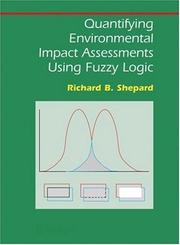| Listing 1 - 8 of 8 |
Sort by
|

ISBN: 1280634235 9786610634231 0387280987 0387243984 Year: 2005 Publisher: New York : Springer,
Abstract | Keywords | Export | Availability | Bookmark
 Loading...
Loading...Choose an application
- Reference Manager
- EndNote
- RefWorks (Direct export to RefWorks)
Environmental impact assessments are required for a wide range of projects throughout the world. These assessments have increasingly involved complex, political decision-making and incorporated values and beliefs of both stakeholders and interested parties. However, the results are often ineffective because values and beliefs are not easily quantifiable, and decisions are considered subjective. This analysis recognizes these problems and proposes practical methods based on fuzzy logic that will enable people preparing assessments to define terms and quantify opinions and input so that they are agreed upon by all involved parties. Fuzzy logic also quantifies the complex environmental, economic and social conditions that are present and are predicted by project alternatives. The author places special emphasis on the types of issues that frequently arise in NEPA environmental assessments and environmental impact statements and in similar regulations that are used in jurisdictions regionally and internationally. The new methods are intended to reduce the time and cost of assessments, while producing justifiable and legally defensible results. First, issues related to current environmental impact assessment methods are discussed. Then the book discusses how lessons learned from computational intelligence can address these problems. It describes how a systematic, logical approach to environmental assessment can be applied to a variety of complex situations. Finally, the design and implementation of a more objective and powerful assessment is demonstrated through a worked example. Explanations of computational intelligence techniques and discussions of helpful software are intended to benefit those people actually preparing and using environmental assessments--in language that makes the process transparent and transferable to all types of systems.
Environmental impact analysis. --- Fuzzy logic. --- Nonlinear logic --- Fuzzy mathematics --- Logic, Symbolic and mathematical --- Fuzzy systems --- Analysis of environmental impact --- Environmental assessment --- Environmental impact assessment --- Environmental impact evaluation --- Impact analysis, Environmental --- Environmental auditing --- Environmental monitoring --- Environmental protection --- Environmental sciences. --- Applied Ecology. --- Environmental law. --- Regional planning. --- Environment, general. --- Math. Appl. in Environmental Science. --- Monitoring/Environmental Analysis. --- Environmental Law/Policy/Ecojustice. --- Landscape/Regional and Urban Planning. --- Regional development --- Regional planning --- State planning --- Human settlements --- Land use --- Planning --- City planning --- Landscape protection --- Environment law --- Environmental control --- Environmental quality --- Environmental policy --- Law --- Sustainable development --- Ecology --- Nature conservation --- Environmental science --- Science --- Government policy --- Law and legislation --- Environment. --- Applied ecology. --- Environmental monitoring. --- Environmental policy. --- Urban planning. --- Cities and towns --- Civic planning --- Land use, Urban --- Model cities --- Redevelopment, Urban --- Slum clearance --- Town planning --- Urban design --- Urban development --- Urban planning --- Art, Municipal --- Civic improvement --- Urban policy --- Urban renewal --- Environment and state --- Environmental management --- State and environment --- Biomonitoring (Ecology) --- Ecological monitoring --- Monitoring, Environmental --- Applied ecology --- Environmental engineering --- Pollution --- Management --- Measurement --- Monitoring --- Balance of nature --- Biology --- Bionomics --- Ecological processes --- Ecological science --- Ecological sciences --- Environment --- Environmental biology --- Oecology --- Environmental sciences --- Population biology
Digital
ISBN: 9780387280981 Year: 2005 Publisher: New York, NY Springer Science+Business Media, Inc
Abstract | Keywords | Export | Availability | Bookmark
 Loading...
Loading...Choose an application
- Reference Manager
- EndNote
- RefWorks (Direct export to RefWorks)
Environmental law --- General ecology and biosociology --- Environmental protection. Environmental technology --- Computer. Automation --- Environmental planning --- milieueffect --- ruimtelijke ordening --- informatica --- ecologie --- milieubeleid --- milieuzorg --- milieurecht --- milieutechnologie
Book
ISBN: 9780387280981 Year: 2005 Publisher: New York NY Springer New York
Abstract | Keywords | Export | Availability | Bookmark
 Loading...
Loading...Choose an application
- Reference Manager
- EndNote
- RefWorks (Direct export to RefWorks)
Environmental impact assessments are required for a wide range of projects throughout the world. These assessments have increasingly involved complex, political decision-making and incorporated values and beliefs of both stakeholders and interested parties. However, the results are often ineffective because values and beliefs are not easily quantifiable, and decisions are considered subjective. This analysis recognizes these problems and proposes practical methods based on fuzzy logic that will enable people preparing assessments to define terms and quantify opinions and input so that they are agreed upon by all involved parties. Fuzzy logic also quantifies the complex environmental, economic and social conditions that are present and are predicted by project alternatives. The author places special emphasis on the types of issues that frequently arise in NEPA environmental assessments and environmental impact statements and in similar regulations that are used in jurisdictions regionally and internationally. The new methods are intended to reduce the time and cost of assessments, while producing justifiable and legally defensible results. First, issues related to current environmental impact assessment methods are discussed. Then the book discusses how lessons learned from computational intelligence can address these problems. It describes how a systematic, logical approach to environmental assessment can be applied to a variety of complex situations. Finally, the design and implementation of a more objective and powerful assessment is demonstrated through a worked example. Explanations of computational intelligence techniques and discussions of helpful software are intended to benefit those people actually preparing and using environmental assessments--in language that makes the process transparent and transferable to all types of systems.
Environmental law --- General ecology and biosociology --- Environmental protection. Environmental technology --- Computer. Automation --- Environmental planning --- milieueffect --- ruimtelijke ordening --- informatica --- ecologie --- milieubeleid --- milieuzorg --- milieurecht --- milieutechnologie

ISBN: 0821203738 Year: 1971 Publisher: New York : Darien House,
Abstract | Keywords | Export | Availability | Bookmark
 Loading...
Loading...Choose an application
- Reference Manager
- EndNote
- RefWorks (Direct export to RefWorks)
Book
ISBN: 0345294351 Year: 1982 Publisher: New York : Ballantine Books,
Abstract | Keywords | Export | Availability | Bookmark
 Loading...
Loading...Choose an application
- Reference Manager
- EndNote
- RefWorks (Direct export to RefWorks)
Jews, East European --- Popular culture --- Social life and customs.
Book
ISBN: 0810923580 Year: 1988 Publisher: New York Abrams
Abstract | Keywords | Export | Availability | Bookmark
 Loading...
Loading...Choose an application
- Reference Manager
- EndNote
- RefWorks (Direct export to RefWorks)
Book
ISBN: 0380407744 Year: 1972 Publisher: New York, N.Y. Darien House, inc.
Abstract | Keywords | Export | Availability | Bookmark
 Loading...
Loading...Choose an application
- Reference Manager
- EndNote
- RefWorks (Direct export to RefWorks)
Film --- film [discipline] --- Marx Brothers, The
Film
Year: 2008 Publisher: S.l. QED International and intermedia
Abstract | Keywords | Export | Availability | Bookmark
 Loading...
Loading...Choose an application
- Reference Manager
- EndNote
- RefWorks (Direct export to RefWorks)
| Listing 1 - 8 of 8 |
Sort by
|

 Search
Search Feedback
Feedback About UniCat
About UniCat  Help
Help News
News